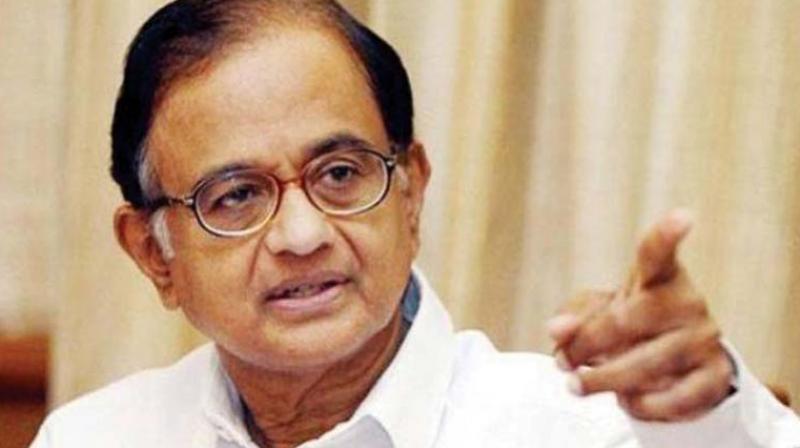To err is human: Can Chidambaram set an example?
The legal battle aside, the real face-off in which Mr Chidambaram must engage is with himself.

In his address to the media at the Congress headquarters before his arrest, senior Congress leader P. Chidambaram sought to clarify that neither he nor anybody in his family had erred in the INX Media case. He asserted that there had been no chargesheet filed against him by either the Enforcement Directorate (ED) or the Central Bureau of Investigation (CBI) before a competent court in the case. The FIR registered by the CBI did not impute any wrongdoing to him yet.
Yet, the Delhi high court had denied protection to Mr Chidambaram which led to his dramatic arrest. When he was produced before a special CBI court on the following day, the court remanded him to its custody. Initially for five days, that remand has now been extended. However, the Supreme Court has temporarily protected him from arrest by the ED.
Legalities aside, all doesn’t seem well regarding the business dealings of the Chidambarams. If these were all totally above board, it shouldn’t be difficult for them to prove the funding sources for the purchase of their foreign assets. It’s quite possible that they don’t remember each and every transaction in detail. But they know the transactions broadly, and how clean or unclean those transactions were.
Yet while the law is trying to understand the “hygiene” aspect of those transactions, the Chidambarams are dodging questions. This would indicate that they have something to hide.
With the help of their friends and colleagues, the Chidambarams have so far outsmarted the investigators despite them having conducted a series of searches at the houses and offices owned by them.
Meanwhile, both the family and the Congress Party have been critical of the Narendra Modi government. Karti Chidambaram has described his father’s arrest as a “politically motivated witch-hunt” and “an attempt to silence the most vocal critic of the government”. The Congress, too, has complained of the CBI being used as “the government’s personal revenge-seeking department”. Some leaders even questioned the motivation of the high court judge who, when so close to retirement, denied protection to Mr Chidambaram from arrest. Others have questioned the dependability of Indrani Mukerjea’s statement that is believed to be the basis of his arrest.
It’s quite possible that there are political undercurrents to this high-profile case. And this fact may not have gone down well with the family and some political parties, particularly the Congress. Some have argued that when other people who have committed grave wrongdoings are moving around scot-free, why be selective? Why target a person who has served the country for nearly four decades? Still, that fact alone doesn’t absolve Mr Chidambaram of his culpability. For this very reason, some other political parties have been guarded in their reaction to the developments. They have been critical of the “manner” or the “process” leading to Mr Chidambaram’s arrest, rather than the fact of his arrest.
Legal consequences are only one dimension of any wrongdoing. There are other, moral, consequences. The wrong done harms one’s own self, one’s immediate family and the people, especially if one is a public figure. The first casualty is one’s own peace of mind. The second comes in terms of what one’s family has to go through. That effect can run through generations! The third casualty is in terms of the example one ends up setting for others. So the consequences of any wrongdoing need to be considered holistically.
An act of bribery, as indeed any crime, is a manifestation of narrow-mindedness. One may be smart enough to get away lightly, but such smartness may not always work in one’s best interest. One could succeed in deceiving the investigating agencies but one can’t deceive one’s own self. Honesty remains the best policy, and more so when one is a public figure.
The legal battle aside, the real face-off in which Mr Chidambaram must engage is with himself. It concerns whether or not to own up to his wrongdoings. The future will play out depending on which way he decides. In this context, a lesson from the real-life story of Easy Eddie may be helpful in gaining perspective.
Those who have heard the story of Easy Eddie and his son Butch O’Hare may recall how a rich American attorney, Eddy, gave up his life fighting for a cause just to set an example of a father that his son could be proud of. His son, O’Hare, grew up and joined the US Air Force. During World War II, O’Hare fought fearlessly against the Japanese forces. He became the first person in the US Air Force to get the Congressional Medal of Honour in the war. It is the highest and most prestigious personal military decoration in the United States.
The key message of the story is this — a family legacy is not always about the money and property one leaves behind. Sometimes it is about values and character. The latter contributes more towards a fulfilling life — not just of one’s own but also of the generations that follow.

